While there will be a precious few who have already carefully studied all of Amoris laetitia, the vast majority of us, so soon after its publication, won’t have. But that does not mean that there are no opinions (some ultra-orthodox channels have gone beyond themselves in pointing out how dangerous the Exhortation and Pope Francis are for us poor Catholics… but such irresponsible agenda-driven writing is another story altogether).
The bishops of the world have had a head start in reading the text, albeit a small one, as Archbishop Mark Coleridge of Brisbane, Australia tweeted this as late as last Wednesday:
I will share some of the thoughts and opinions of local bishops in this post, which may be a guide in looking at the actual text as we read it, taking our time as Pope Francis suggested, for ourselves. Some excerpts from their various commentaries:
 Bishop Gerard de Korte, bishop-elect of ‘s-Hertogenbosch and Apostolic Administrator of Groningen-Leeuwarden: “As far as I can see the Pope tries, in the first place, to be a pastoral teacher. … In Amoris laetitia Francis pleads for an inclusive Church. The Pope does not want to build walls, but bridges. People who have failed in relationships are also a part of the Church and must be able to continue with their lives. Wise pastors can, in the privacy of pastoral encounter, support failing people and help them, so that they can continue with the journey of their lives. It is about continuous dialogue with people who, even when they have fallen short, are and remain God’s creatures.”
Bishop Gerard de Korte, bishop-elect of ‘s-Hertogenbosch and Apostolic Administrator of Groningen-Leeuwarden: “As far as I can see the Pope tries, in the first place, to be a pastoral teacher. … In Amoris laetitia Francis pleads for an inclusive Church. The Pope does not want to build walls, but bridges. People who have failed in relationships are also a part of the Church and must be able to continue with their lives. Wise pastors can, in the privacy of pastoral encounter, support failing people and help them, so that they can continue with the journey of their lives. It is about continuous dialogue with people who, even when they have fallen short, are and remain God’s creatures.”
 Bishop Jan Hendriks, Auxiliary Bishop of Haarlem-Amsterdam: “The Exhortation has a very strong pastoral spirit. The text breathes understanding and love for all people. Nothing is being rationalised or denied, no new doors are opened that were closed, but throughout the entire document there is a warm, ‘inclusive’ spirit: you belong, even when the situation you are in is not perfect. Besides, we are all people “on our way”. Developing what’s good and involving people where possible is the starting point of the ‘divine pedagogy’ that the document intends to promote. Teaching remains teaching, but what matters here is the approach of people and that is open, warm and pastoral.”
Bishop Jan Hendriks, Auxiliary Bishop of Haarlem-Amsterdam: “The Exhortation has a very strong pastoral spirit. The text breathes understanding and love for all people. Nothing is being rationalised or denied, no new doors are opened that were closed, but throughout the entire document there is a warm, ‘inclusive’ spirit: you belong, even when the situation you are in is not perfect. Besides, we are all people “on our way”. Developing what’s good and involving people where possible is the starting point of the ‘divine pedagogy’ that the document intends to promote. Teaching remains teaching, but what matters here is the approach of people and that is open, warm and pastoral.”
 Archbishop Stefan Heße, Archbishop of Hamburg: “The Pope is aware of the realities of life of the people of today. In the past decades this reality has changed more than in the centuries before. On the other hand, Francis makes clear: we do not reject our ideals. But we must consider anew how people can live according to them. We must succeed in building a stable bridge between ideal and reality. The Pope consciously made no new regulations. He rather wants to provide the means to promote the formation of people’s conscience.”
Archbishop Stefan Heße, Archbishop of Hamburg: “The Pope is aware of the realities of life of the people of today. In the past decades this reality has changed more than in the centuries before. On the other hand, Francis makes clear: we do not reject our ideals. But we must consider anew how people can live according to them. We must succeed in building a stable bridge between ideal and reality. The Pope consciously made no new regulations. He rather wants to provide the means to promote the formation of people’s conscience.”
 Archbishop Heiner Koch, Archbishop of Berlin: “I see this text as a great invitation to the local Churches, to commit ourselves even more to marriage and family, in marriage preparation, the guidance of married couples, but also in the attention to remarried divorcees and single parents. … Pope Francis rejects any “cold bureaurcratic morality” and describes all pastoral care as “merciful love”, which is “ever ready to understand, forgive, accompany, hope, and above all integrate” (n. 312).
Archbishop Heiner Koch, Archbishop of Berlin: “I see this text as a great invitation to the local Churches, to commit ourselves even more to marriage and family, in marriage preparation, the guidance of married couples, but also in the attention to remarried divorcees and single parents. … Pope Francis rejects any “cold bureaurcratic morality” and describes all pastoral care as “merciful love”, which is “ever ready to understand, forgive, accompany, hope, and above all integrate” (n. 312).
 Msgr. Andreas Kutschke, Diocesan Administrator of Dresden-Meißen: “The text reminds us that the loving God cares for every person and wants him to grow towards Him. That is our good news to the whole of society. The actions of the Church regarding marriage and family must always direct themselves to that. The challenges of the Gospel should not be concealed, but addressed in a timely and comprehensible manner. That is the tone of this multilayered text.”
Msgr. Andreas Kutschke, Diocesan Administrator of Dresden-Meißen: “The text reminds us that the loving God cares for every person and wants him to grow towards Him. That is our good news to the whole of society. The actions of the Church regarding marriage and family must always direct themselves to that. The challenges of the Gospel should not be concealed, but addressed in a timely and comprehensible manner. That is the tone of this multilayered text.”
 Archbishop Ludwig Schick, Archbishop of Bamberg: “The Pope shows himself a realist in Amoris laetitia. He knows that marriage and family need special attention in Church and society today, so that they can really be lasting communities of love. That is why, in addition to the fundamental statements, based on the Bible and the Tradition of the Church, about the beauty, richness, value and necessity of marriage, it is important for the Pope that marriage preparation and the guidance of families gets a closer look. State and society, employers, associations and individuals are encouraged to support marriage and family more and give them the necessary assistance.”
Archbishop Ludwig Schick, Archbishop of Bamberg: “The Pope shows himself a realist in Amoris laetitia. He knows that marriage and family need special attention in Church and society today, so that they can really be lasting communities of love. That is why, in addition to the fundamental statements, based on the Bible and the Tradition of the Church, about the beauty, richness, value and necessity of marriage, it is important for the Pope that marriage preparation and the guidance of families gets a closer look. State and society, employers, associations and individuals are encouraged to support marriage and family more and give them the necessary assistance.”
 Bishop Luc Van Looy, Bishop of Ghent: “Amoris laetitia is in the first place a pastoral and not a doctrinal document. This means that it departs from reality as it exists in all its complexity and diversity. That reality is listened to, and not in the first place condemned. The good that is present must be promoted and given the chance to grow. A pastoral approach means: walking together (synodal) in joy (laetitia), but also in difficult times and crises that people go through in relationships and the raising of children. This must happen with sensitivity, with a lot of respect, tactfully and patiently, in dialogue and without preconceptions. Secondly, this pastoral approach is an inclusive approach. This means that no one is excluded. That is the baseline, if you will, of the entire document, which can be summarised in the key words in the title of the important eighth chapter: Accompanying, discerning and integrating. The Church must do all to let people, in whatever situation they find themselves, be part of the community. That returns like a refrain.”
Bishop Luc Van Looy, Bishop of Ghent: “Amoris laetitia is in the first place a pastoral and not a doctrinal document. This means that it departs from reality as it exists in all its complexity and diversity. That reality is listened to, and not in the first place condemned. The good that is present must be promoted and given the chance to grow. A pastoral approach means: walking together (synodal) in joy (laetitia), but also in difficult times and crises that people go through in relationships and the raising of children. This must happen with sensitivity, with a lot of respect, tactfully and patiently, in dialogue and without preconceptions. Secondly, this pastoral approach is an inclusive approach. This means that no one is excluded. That is the baseline, if you will, of the entire document, which can be summarised in the key words in the title of the important eighth chapter: Accompanying, discerning and integrating. The Church must do all to let people, in whatever situation they find themselves, be part of the community. That returns like a refrain.”
 Bishop Rudolf Voderholzer, Bishop of Regensburg: “Amoris laetitia is an attractive and inviting text, a hymn on God-given love. It contains neither generalisations nor blanket solutions. I hope very much that chapters two and three, which recall in a new and fresh way the Biblical and doctrinal basis of conjugal love, will be read and internalised. Of course the Holy Father especially takes those situations into account, in which people are threatening to fail or have failed to achieve the ideal. It is the wish of the Church, the Pope says, “to help each family to discover the best way to overcome any obstacles it encounters” (AL 200).”
Bishop Rudolf Voderholzer, Bishop of Regensburg: “Amoris laetitia is an attractive and inviting text, a hymn on God-given love. It contains neither generalisations nor blanket solutions. I hope very much that chapters two and three, which recall in a new and fresh way the Biblical and doctrinal basis of conjugal love, will be read and internalised. Of course the Holy Father especially takes those situations into account, in which people are threatening to fail or have failed to achieve the ideal. It is the wish of the Church, the Pope says, “to help each family to discover the best way to overcome any obstacles it encounters” (AL 200).”
 Bishop Frans Wiertz, Bishop of Roermond: “In his text, the Pope wants to emphasise mercy. Although nothing changes in the ideal of marriages and the rules surrounding receiving the sacraments, the Pope invites everyone in the Church to find ways in which no one will have to feel excluded. These words of the Pope are important for many Catholics, as they want to clarify that the ideal of a good life can always only be achieved via a way which knows imperfections in reality. Although no one can afford to accept broken or unwanted situations, at the same no one is excluded or treated second-rate because of the situation in which they find themselves.”
Bishop Frans Wiertz, Bishop of Roermond: “In his text, the Pope wants to emphasise mercy. Although nothing changes in the ideal of marriages and the rules surrounding receiving the sacraments, the Pope invites everyone in the Church to find ways in which no one will have to feel excluded. These words of the Pope are important for many Catholics, as they want to clarify that the ideal of a good life can always only be achieved via a way which knows imperfections in reality. Although no one can afford to accept broken or unwanted situations, at the same no one is excluded or treated second-rate because of the situation in which they find themselves.”
 Rainer Maria Cardinal Woelki, Archbishop of Cologne: “It is above all important for Pope Francis that the Church is close to people, that she avoids every appearance of idealistic exagerration, indifferentiated judgement, loveless condemnation or even exclusion. This attitude of closeness, a “humble realism” and mercy remains in tension with the fact that the Church is always ‘Mater et Magistra’, mother and teacher, which does not witthold the people anything that the Creator has wanted in Creation and taught through Christ.”
Rainer Maria Cardinal Woelki, Archbishop of Cologne: “It is above all important for Pope Francis that the Church is close to people, that she avoids every appearance of idealistic exagerration, indifferentiated judgement, loveless condemnation or even exclusion. This attitude of closeness, a “humble realism” and mercy remains in tension with the fact that the Church is always ‘Mater et Magistra’, mother and teacher, which does not witthold the people anything that the Creator has wanted in Creation and taught through Christ.”
 Bishop Konrad Zdarsa, Bishop of Augsburg: “In the introduction, the Holy Father recommends not to read it hastily. That is why I will not be commenting in haste. Read those sections that are important to you in your situation, relate to them in all peace in your family, consider them also carefully in your parish communities and pastoral councils.”
Bishop Konrad Zdarsa, Bishop of Augsburg: “In the introduction, the Holy Father recommends not to read it hastily. That is why I will not be commenting in haste. Read those sections that are important to you in your situation, relate to them in all peace in your family, consider them also carefully in your parish communities and pastoral councils.”
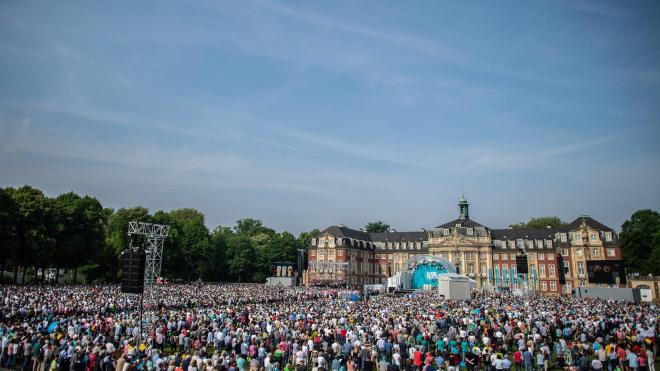
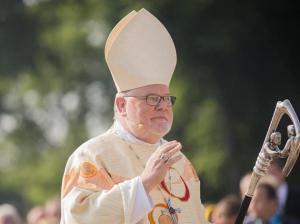 In his homily at the closing Mass of the four-day event, Cardinal Marx reiterated that the Catholic Church must make its unity clear, and that includes its bishops.
In his homily at the closing Mass of the four-day event, Cardinal Marx reiterated that the Catholic Church must make its unity clear, and that includes its bishops.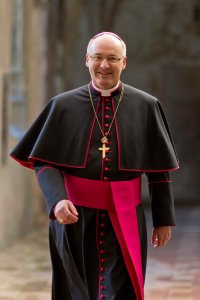
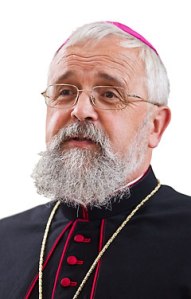 Opposing the actions of the seven bishops is Bishop Gerhard Feige, bishop of Magdeburg and president of the ecumenism commission of the German Bishops’ Conference. In a contribution to Der Zeit last Thursday, Msgr. Feige stated that not taking the chance to help people deepen the joy of the faith and their participation in the Eucharist, as well as promoting ecumenical encounters and strengthening the marriage bond would be “macabre and shameful”. Contrary to other bishops, Msgr. Feige insists that the pastoral outreach exists within modern theological and legal possibilities, referring to the canon law paragraphs which allow local bishops to decide under which circumstances non-Catholic can receive Communion. These circumstances, however, are emergency situations in which the danger of death and the unavailability of ministers of a person’s own denomination play key roles.
Opposing the actions of the seven bishops is Bishop Gerhard Feige, bishop of Magdeburg and president of the ecumenism commission of the German Bishops’ Conference. In a contribution to Der Zeit last Thursday, Msgr. Feige stated that not taking the chance to help people deepen the joy of the faith and their participation in the Eucharist, as well as promoting ecumenical encounters and strengthening the marriage bond would be “macabre and shameful”. Contrary to other bishops, Msgr. Feige insists that the pastoral outreach exists within modern theological and legal possibilities, referring to the canon law paragraphs which allow local bishops to decide under which circumstances non-Catholic can receive Communion. These circumstances, however, are emergency situations in which the danger of death and the unavailability of ministers of a person’s own denomination play key roles.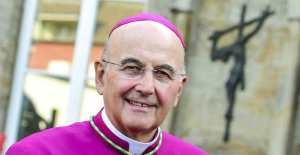 Münster’s Bishop Felix Genn is hopeful of finding a consensus. While the way in which the seven bishops expressed their difficulties with the conference’s vote did not make him happy, he understands their questions of conscience. In an interview for WDR radio Bishop Genn expressed his happiness about the way in which the standing council of the bishops’ conference discussed the issue last week. And although he would have preferred that the seven bishops had first informed the others about their letter before sending it, Bishop Genn’s attitude is perhaps the most consensus-minded in the delegation, which may be a reason for his inclusion. The bishop, for his part, simply thought of his mother’s motto when hearing about being included in the delegation: “One has never got enough work to do.”
Münster’s Bishop Felix Genn is hopeful of finding a consensus. While the way in which the seven bishops expressed their difficulties with the conference’s vote did not make him happy, he understands their questions of conscience. In an interview for WDR radio Bishop Genn expressed his happiness about the way in which the standing council of the bishops’ conference discussed the issue last week. And although he would have preferred that the seven bishops had first informed the others about their letter before sending it, Bishop Genn’s attitude is perhaps the most consensus-minded in the delegation, which may be a reason for his inclusion. The bishop, for his part, simply thought of his mother’s motto when hearing about being included in the delegation: “One has never got enough work to do.”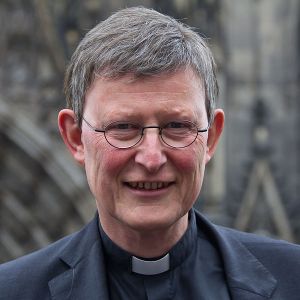 While the letter by Cardinal Woelki, Archbishop Schick and Bishops Zdarsa, Hanke, Ipolt, Voderholzer and Oster received much attention in the media, the signatories themselves treated it as a normal matter of correspondence. Cardinal Woelki, who was visiting Ukraine when the news broke, expressed his surprise at the hype and the talk about dissent. Presenting the questions about intercommunion to Rome was not so much a matter of going against his fellow bishops, but rather came from the importance of the matter: “With several bishops, we were convinced that it would be good to universally coordinate the solution that we have discussed and established here, with an eye on the unity of the Church and the common ground with the other particular churches.” Cardinal Woelki is not so much opposed to the proposals from the conference, to allow non-Catholic spouses of Catholics to receive Communion with their partner on a case-by-case basis, but does not think it is a decision that should be made by the German bishops alone.
While the letter by Cardinal Woelki, Archbishop Schick and Bishops Zdarsa, Hanke, Ipolt, Voderholzer and Oster received much attention in the media, the signatories themselves treated it as a normal matter of correspondence. Cardinal Woelki, who was visiting Ukraine when the news broke, expressed his surprise at the hype and the talk about dissent. Presenting the questions about intercommunion to Rome was not so much a matter of going against his fellow bishops, but rather came from the importance of the matter: “With several bishops, we were convinced that it would be good to universally coordinate the solution that we have discussed and established here, with an eye on the unity of the Church and the common ground with the other particular churches.” Cardinal Woelki is not so much opposed to the proposals from the conference, to allow non-Catholic spouses of Catholics to receive Communion with their partner on a case-by-case basis, but does not think it is a decision that should be made by the German bishops alone.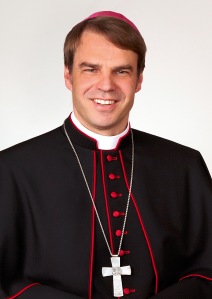 The most extensive explanation for signing the letter comes from Bishop Stefan Oster of Passau. In an article published in the diocesan magazine and
The most extensive explanation for signing the letter comes from Bishop Stefan Oster of Passau. In an article published in the diocesan magazine and 

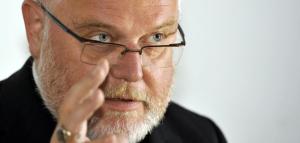 Cardinal Reinhard Marx, president of the German Bishops’ Conference, responded with a letter to all German bishops – a decision motivated by the fact that the letter concerns a decision made by the entire conference and was sent to the Holy See and the Apostolic Nuncio. In his response, he emphasises that no decision has been made to allow non-Catholics to receive Communion, but that there is a working document which may still be amended or changed. The cardinal also reminds the authors that bishops’ conferences and individual bishops have the right, according to canon law, to determine when Holy Communion can be given licitly to non-Catholics.
Cardinal Reinhard Marx, president of the German Bishops’ Conference, responded with a letter to all German bishops – a decision motivated by the fact that the letter concerns a decision made by the entire conference and was sent to the Holy See and the Apostolic Nuncio. In his response, he emphasises that no decision has been made to allow non-Catholics to receive Communion, but that there is a working document which may still be amended or changed. The cardinal also reminds the authors that bishops’ conferences and individual bishops have the right, according to canon law, to determine when Holy Communion can be given licitly to non-Catholics. Bishop Gerard de Korte, bishop-elect of ‘s-Hertogenbosch and Apostolic Administrator of Groningen-Leeuwarden: “As far as I can see the Pope tries, in the first place, to be a pastoral teacher. … In Amoris laetitia Francis pleads for an inclusive Church. The Pope does not want to build walls, but bridges. People who have failed in relationships are also a part of the Church and must be able to continue with their lives. Wise pastors can, in the privacy of pastoral encounter, support failing people and help them, so that they can continue with the journey of their lives. It is about continuous dialogue with people who, even when they have fallen short, are and remain God’s creatures.”
Bishop Gerard de Korte, bishop-elect of ‘s-Hertogenbosch and Apostolic Administrator of Groningen-Leeuwarden: “As far as I can see the Pope tries, in the first place, to be a pastoral teacher. … In Amoris laetitia Francis pleads for an inclusive Church. The Pope does not want to build walls, but bridges. People who have failed in relationships are also a part of the Church and must be able to continue with their lives. Wise pastors can, in the privacy of pastoral encounter, support failing people and help them, so that they can continue with the journey of their lives. It is about continuous dialogue with people who, even when they have fallen short, are and remain God’s creatures.” Bishop Jan Hendriks, Auxiliary Bishop of Haarlem-Amsterdam: “The Exhortation has a very strong pastoral spirit. The text breathes understanding and love for all people. Nothing is being rationalised or denied, no new doors are opened that were closed, but throughout the entire document there is a warm, ‘inclusive’ spirit: you belong, even when the situation you are in is not perfect. Besides, we are all people “on our way”. Developing what’s good and involving people where possible is the starting point of the ‘divine pedagogy’ that the document intends to promote. Teaching remains teaching, but what matters here is the approach of people and that is open, warm and pastoral.”
Bishop Jan Hendriks, Auxiliary Bishop of Haarlem-Amsterdam: “The Exhortation has a very strong pastoral spirit. The text breathes understanding and love for all people. Nothing is being rationalised or denied, no new doors are opened that were closed, but throughout the entire document there is a warm, ‘inclusive’ spirit: you belong, even when the situation you are in is not perfect. Besides, we are all people “on our way”. Developing what’s good and involving people where possible is the starting point of the ‘divine pedagogy’ that the document intends to promote. Teaching remains teaching, but what matters here is the approach of people and that is open, warm and pastoral.” Archbishop Stefan Heße, Archbishop of Hamburg: “The Pope is aware of the realities of life of the people of today. In the past decades this reality has changed more than in the centuries before. On the other hand, Francis makes clear: we do not reject our ideals. But we must consider anew how people can live according to them. We must succeed in building a stable bridge between ideal and reality. The Pope consciously made no new regulations. He rather wants to provide the means to promote the formation of people’s conscience.”
Archbishop Stefan Heße, Archbishop of Hamburg: “The Pope is aware of the realities of life of the people of today. In the past decades this reality has changed more than in the centuries before. On the other hand, Francis makes clear: we do not reject our ideals. But we must consider anew how people can live according to them. We must succeed in building a stable bridge between ideal and reality. The Pope consciously made no new regulations. He rather wants to provide the means to promote the formation of people’s conscience.” Archbishop Heiner Koch, Archbishop of Berlin: “I see this text as a great invitation to the local Churches, to commit ourselves even more to marriage and family, in marriage preparation, the guidance of married couples, but also in the attention to remarried divorcees and single parents. … Pope Francis rejects any “cold bureaurcratic morality” and describes all pastoral care as “merciful love”, which is “ever ready to understand, forgive, accompany, hope, and above all integrate” (n. 312).
Archbishop Heiner Koch, Archbishop of Berlin: “I see this text as a great invitation to the local Churches, to commit ourselves even more to marriage and family, in marriage preparation, the guidance of married couples, but also in the attention to remarried divorcees and single parents. … Pope Francis rejects any “cold bureaurcratic morality” and describes all pastoral care as “merciful love”, which is “ever ready to understand, forgive, accompany, hope, and above all integrate” (n. 312). Msgr. Andreas Kutschke, Diocesan Administrator of Dresden-Meißen: “The text reminds us that the loving God cares for every person and wants him to grow towards Him. That is our good news to the whole of society. The actions of the Church regarding marriage and family must always direct themselves to that. The challenges of the Gospel should not be concealed, but addressed in a timely and comprehensible manner. That is the tone of this multilayered text.”
Msgr. Andreas Kutschke, Diocesan Administrator of Dresden-Meißen: “The text reminds us that the loving God cares for every person and wants him to grow towards Him. That is our good news to the whole of society. The actions of the Church regarding marriage and family must always direct themselves to that. The challenges of the Gospel should not be concealed, but addressed in a timely and comprehensible manner. That is the tone of this multilayered text.” Archbishop Ludwig Schick, Archbishop of Bamberg: “The Pope shows himself a realist in Amoris laetitia. He knows that marriage and family need special attention in Church and society today, so that they can really be lasting communities of love. That is why, in addition to the fundamental statements, based on the Bible and the Tradition of the Church, about the beauty, richness, value and necessity of marriage, it is important for the Pope that marriage preparation and the guidance of families gets a closer look. State and society, employers, associations and individuals are encouraged to support marriage and family more and give them the necessary assistance.”
Archbishop Ludwig Schick, Archbishop of Bamberg: “The Pope shows himself a realist in Amoris laetitia. He knows that marriage and family need special attention in Church and society today, so that they can really be lasting communities of love. That is why, in addition to the fundamental statements, based on the Bible and the Tradition of the Church, about the beauty, richness, value and necessity of marriage, it is important for the Pope that marriage preparation and the guidance of families gets a closer look. State and society, employers, associations and individuals are encouraged to support marriage and family more and give them the necessary assistance.” Bishop Luc Van Looy, Bishop of Ghent: “Amoris laetitia is in the first place a pastoral and not a doctrinal document. This means that it departs from reality as it exists in all its complexity and diversity. That reality is listened to, and not in the first place condemned. The good that is present must be promoted and given the chance to grow. A pastoral approach means: walking together (synodal) in joy (laetitia), but also in difficult times and crises that people go through in relationships and the raising of children. This must happen with sensitivity, with a lot of respect, tactfully and patiently, in dialogue and without preconceptions. Secondly, this pastoral approach is an inclusive approach. This means that no one is excluded. That is the baseline, if you will, of the entire document, which can be summarised in the key words in the title of the important eighth chapter: Accompanying, discerning and integrating. The Church must do all to let people, in whatever situation they find themselves, be part of the community. That returns like a refrain.”
Bishop Luc Van Looy, Bishop of Ghent: “Amoris laetitia is in the first place a pastoral and not a doctrinal document. This means that it departs from reality as it exists in all its complexity and diversity. That reality is listened to, and not in the first place condemned. The good that is present must be promoted and given the chance to grow. A pastoral approach means: walking together (synodal) in joy (laetitia), but also in difficult times and crises that people go through in relationships and the raising of children. This must happen with sensitivity, with a lot of respect, tactfully and patiently, in dialogue and without preconceptions. Secondly, this pastoral approach is an inclusive approach. This means that no one is excluded. That is the baseline, if you will, of the entire document, which can be summarised in the key words in the title of the important eighth chapter: Accompanying, discerning and integrating. The Church must do all to let people, in whatever situation they find themselves, be part of the community. That returns like a refrain.” Bishop Rudolf Voderholzer, Bishop of Regensburg: “Amoris laetitia is an attractive and inviting text, a hymn on God-given love. It contains neither generalisations nor blanket solutions. I hope very much that chapters two and three, which recall in a new and fresh way the Biblical and doctrinal basis of conjugal love, will be read and internalised. Of course the Holy Father especially takes those situations into account, in which people are threatening to fail or have failed to achieve the ideal. It is the wish of the Church, the Pope says, “to help each family to discover the best way to overcome any obstacles it encounters” (AL 200).”
Bishop Rudolf Voderholzer, Bishop of Regensburg: “Amoris laetitia is an attractive and inviting text, a hymn on God-given love. It contains neither generalisations nor blanket solutions. I hope very much that chapters two and three, which recall in a new and fresh way the Biblical and doctrinal basis of conjugal love, will be read and internalised. Of course the Holy Father especially takes those situations into account, in which people are threatening to fail or have failed to achieve the ideal. It is the wish of the Church, the Pope says, “to help each family to discover the best way to overcome any obstacles it encounters” (AL 200).” Bishop Frans Wiertz, Bishop of Roermond: “In his text, the Pope wants to emphasise mercy. Although nothing changes in the ideal of marriages and the rules surrounding receiving the sacraments, the Pope invites everyone in the Church to find ways in which no one will have to feel excluded. These words of the Pope are important for many Catholics, as they want to clarify that the ideal of a good life can always only be achieved via a way which knows imperfections in reality. Although no one can afford to accept broken or unwanted situations, at the same no one is excluded or treated second-rate because of the situation in which they find themselves.”
Bishop Frans Wiertz, Bishop of Roermond: “In his text, the Pope wants to emphasise mercy. Although nothing changes in the ideal of marriages and the rules surrounding receiving the sacraments, the Pope invites everyone in the Church to find ways in which no one will have to feel excluded. These words of the Pope are important for many Catholics, as they want to clarify that the ideal of a good life can always only be achieved via a way which knows imperfections in reality. Although no one can afford to accept broken or unwanted situations, at the same no one is excluded or treated second-rate because of the situation in which they find themselves.” Rainer Maria Cardinal Woelki, Archbishop of Cologne: “It is above all important for Pope Francis that the Church is close to people, that she avoids every appearance of idealistic exagerration, indifferentiated judgement, loveless condemnation or even exclusion. This attitude of closeness, a “humble realism” and mercy remains in tension with the fact that the Church is always ‘Mater et Magistra’, mother and teacher, which does not witthold the people anything that the Creator has wanted in Creation and taught through Christ.”
Rainer Maria Cardinal Woelki, Archbishop of Cologne: “It is above all important for Pope Francis that the Church is close to people, that she avoids every appearance of idealistic exagerration, indifferentiated judgement, loveless condemnation or even exclusion. This attitude of closeness, a “humble realism” and mercy remains in tension with the fact that the Church is always ‘Mater et Magistra’, mother and teacher, which does not witthold the people anything that the Creator has wanted in Creation and taught through Christ.” Bishop Konrad Zdarsa, Bishop of Augsburg: “In the introduction, the Holy Father recommends not to read it hastily. That is why I will not be commenting in haste. Read those sections that are important to you in your situation, relate to them in all peace in your family, consider them also carefully in your parish communities and pastoral councils.”
Bishop Konrad Zdarsa, Bishop of Augsburg: “In the introduction, the Holy Father recommends not to read it hastily. That is why I will not be commenting in haste. Read those sections that are important to you in your situation, relate to them in all peace in your family, consider them also carefully in your parish communities and pastoral councils.”
 Just to show that not all German bishops intent on upending all Catholic teaching, as some media would have us believe, here is a translation of a letter sent by five bishops to the bishop of Passau, msgr. Stefan Oster, after the latter criticised the call from the Central Committee of German Catholics (the ZdK) to start blessing same-sex relationships as well as new relationships of divorced Catholics. The ZdK is a lay movement recognised by the Bishops’ Conference to promote the lay apostolate in the Church. Bishop Oster criticised their proposal by pointing out the Biblical basis of marriage and the understanding of Biblical revelation. He also pointed out that the “use” of Pope Francis to support the calls for change has no basis in reality.
Just to show that not all German bishops intent on upending all Catholic teaching, as some media would have us believe, here is a translation of a letter sent by five bishops to the bishop of Passau, msgr. Stefan Oster, after the latter criticised the call from the Central Committee of German Catholics (the ZdK) to start blessing same-sex relationships as well as new relationships of divorced Catholics. The ZdK is a lay movement recognised by the Bishops’ Conference to promote the lay apostolate in the Church. Bishop Oster criticised their proposal by pointing out the Biblical basis of marriage and the understanding of Biblical revelation. He also pointed out that the “use” of Pope Francis to support the calls for change has no basis in reality.

